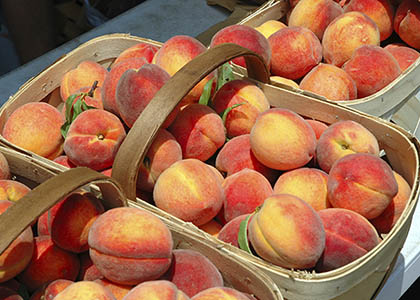
6 Great Benefits of Eating What’s in Season
By Claire Georgiou, Reboot Naturopath, B.HSc ND
As the weather changes across the globe so does the fresh produce that is available. Each season offers an array of beautiful fresh produce, this is a great time to start experimenting and trying new recipes or reworking those old ones to incorporate more seasonal fruits and vegetables. Not only will your palate be impressed but there are health benefits too. Here are the many benefits to eating seasonally!
Seasonal Produce:
- Tastes Better
In-season produce is fresher and tastes better, sweeter and perfectly ripe. When fruits and vegetables are picked for consumption that have been naturally ripened on the vine or the tree and harvested at the right time, it will have much more flavor and nutrition. Most people have experienced that super juicy perfectly sweet orange in winter or that crispy sweet pineapple in summer.When transporting crops, it must be harvested early and refrigerated so they don’t spoil during transportation; chilling will reduce the flavor. Then when they get to their destination they then may need to be heated in a hot house to artificially ripen the produce before it goes onto the shelves, this greatly reduces the flavor, changes the texture and the taste.Think of those floury apples, flavorless tomatoes and limp tasteless greens. You may find that the food may be half rotten inside or overly fibrous such as an out-of-season pineapple.
- Cheaper
When farmers are harvesting a large abundance of produce due to the crop being in season, the cost of the produce will go down. When the produce is locally sourced because it’s in season in your area, then travelling expenses and storage are not required therefore reducing the production costs that are then passed onto the consumer.When we buy produce that is out of season, it’s normally sourced from out of area locations that have a different climate and it can also be stored for long periods of time to offer people a variety of produce all year round, these factors will push the price up. Here are more reasons we love local produce.
- Fresher with a Higher Nutritional Value
Produce that is purchased in season is more likely to be fresher, consumed closer to harvesting and higher in nutritional value, some anti-oxidants such as Vitamin C, folate and carotenes will rapidly decline when stored for periods of time. Locally in-season sourced fruits and vegetables will also appear brighter and more vibrant rather than limp and dried up.Fruits and vegetables that are stored for long periods of time due to transportation or to be used at a later date have a reduction in phyto-nutrient content. Large markets and grocers may buy out-of -season produce that has been gassed, irradiated (a burst of radiation to kill germs) and preserved in wax to extent the shelf life.
- Avoids Overseas Contaminates
When fruits and vegetables are sourced overseas you can’t be sure what their regulations for pesticides, herbicides and fungicides are. Many countries across the globe have very relaxed laws about chemicals being sprayed on fruits and vegetables that other countries have banned due to their known harmful effects.Overseas agriculture may not regulate soil contamination tests to ensure land and soil quality. Some agricultural areas have been shown to have very high heavy metal and other toxic contaminates due to industrial sites inhabiting the same area.Health practices in some countries may leave a lot to be desired. Here in Australia we have recently had a large contamination of Hepatitis A from frozen berries that have come from China. Due to poor hygiene practices overseas this has then infected many Australians.Produce such as garlic is irradiated, bleached and sprayed with methyl bromide to withstand quarantine and long periods of travel as many of fruits and vegetables are that make the long haul trip in ships.When produce is in season, cheaper and often on sale it’s a great time to buy in bulk for yourself and preserve, pickle, ferment, freeze and store your own food at home. I collect berries, mangoes, peaches, nectarines in season and store in the freezer, chopped up for later use and I can be sure where they have come from.
- Supports Your Body’s Natural Nutritional Needs
In winter we are provided by nature all things citrus, these are particularly high in Vitamin C which is very important for preventing infections such as colds and flu’s. Winter vegetables offer comfort and are perfect for hot meals, healthy stews, soups, casseroles and other warming meals.Summer foods such as stone fruits provide us with extra beta-carotenes and other carotenoids that help protect us against sun damage, they also provide more sweetness for an energetic summer, as well as salad vegetables for those tasty cool summer salads.
- More Environmentally-Friendly
Eating seasonally reduces the demand for out of season produce which further supports more local produce and supports local farming in your area which means less transportation, less refrigeration, less hot houses, and less irradiation of produce.
It’s really important to note that it’s not always possible to eat locally and seasonally for everyone all of the time. It’s more about the importance of making decisions where possible that are better for you, your wallet and your health where you can.
Now that so much produce is available for most of the year, it’s easy to lose track of its seasonality.
Here are seasonal food guides: